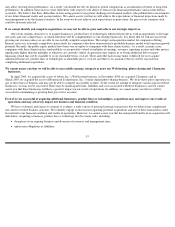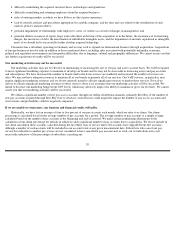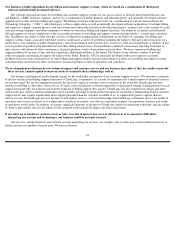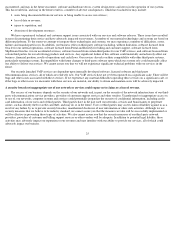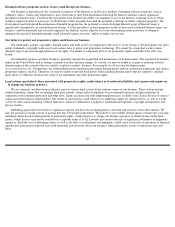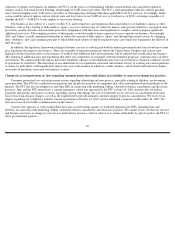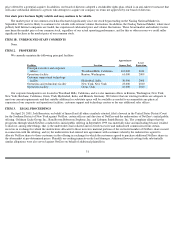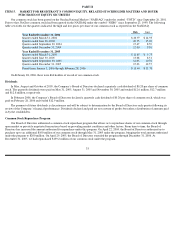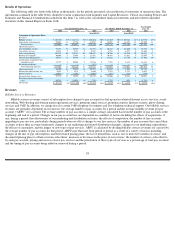Classmates.com 2005 Annual Report Download - page 29
Download and view the complete annual report
Please find page 29 of the 2005 Classmates.com annual report below. You can navigate through the pages in the report by either clicking on the pages listed below, or by using the keyword search tool below to find specific information within the annual report.
On June 3, 2005, the FCC released an order and notice of proposed rulemaking concerning the provision of emergency services by certain
VoIP providers. While the order does not currently apply to our VoIP services, the FCC’s rulemaking is considering whether to extend the order
requiring providers of VoIP services to offer E-911 capabilities to VoIP services like ours. Should this occur, we would incur additional
expenses and could be restricted from offering our service or accepting new customers in markets where we have not deployed an E-
911 solution
that conforms to the requirements of the order. We have not deployed an E-911 solution and do not expect to have an E-
911 solution available in
the near term, if at all.
On September 9, 2005, the FCC granted, in part, a petition from the California Public Utilities Commission, or CPUC, seeking authority to
implement two statewide specialized area code overlays in California. VoIP and dialup Internet access services may be subject to the specialized
overlays should the CPUC choose to implement their delegated authority. If the CPUC does so, users of VoIP services could be required to
obtain telephone numbers from specific area codes and we could be required to provision new telephone numbers to our customers that access
our service via dialup accounts. The FCC’s order allows the CPUC to determine what services will be required to assign numbers from the
specialized overlay area codes. Should the CPUC determine that VoIP providers must assign telephone numbers from the specialized overlay
area codes, we could be placed at a competitive disadvantage compared to traditional telecommunications providers because our ability to offer
telephone numbers from a variety of California area codes would be limited. Also, future customers may not be able to transfer their existing
telephone numbers to our service. These results could have a material adverse effect on our business. Certain parties have filed petitions for
reconsideration of the FCC’s order that could result in the modification of the FCC’s delegation of authority to the CPUC.
The Communications Assistance for Law Enforcement Act, or CALEA, mandates that providers of communications services assist law
enforcement agencies in conducting lawfully authorized electronic surveillance. On September 23, 2005, the FCC released an order concluding
that CALEA applies to certain VoIP providers. Currently, that order does not apply to VoIP services like those we provide. However, the FCC is
considering whether to expand the scope of the order to include VoIP providers like us. We cannot predict what the FCC will conclude in that
proceeding or what effect, if any, it may have on our business.
On February 14, 2006, the FCC released a Notice of Proposed Rulemaking that will examine existing practices in the telecommunications
industry to protect consumers’ privacy. The FCC is considering, among other issues, the security measures carriers currently have in place, what
inadequacies exist in those measures, and what additional or enhanced security measures may be warranted to better protect consumers’ privacy.
The FCC is also seeking comment on whether it is appropriate to extend these privacy rules to providers of VoIP and other IP-enabled services.
If the rules are adopted and applied to our VoIP services, the proposed requirements could change the way that we interact with our subscribers
and how we maintain or share customer records, and could therefore impose new costs on our business.
Although these federal regulations applicable to certain VoIP services do not currently apply to our VoIP services, our VoIP services may
subsequently become subject to these regulations as well as other state or federal regulations as a result of changes we make to these services,
changes made to the regulations or the interpretation of them, or the adoption of new laws and regulations applicable to our VoIP services.
Moreover, if we offer new services that are subject to different and additional governmental regulation, we may have to comply with additional
laws and regulations that currently are not applicable to us. If the regulatory status of our VoIP service offerings changes or if we offer new
services that subject us to new laws and regulations, our business may be adversely affected.
The Internet Tax Freedom Act, which placed a moratorium on new state and local taxes on Internet commerce, has been extended through
November 2007. However, future laws imposing taxes or other regulations on the provision of goods and services over the Internet could make it
substantially more
28



